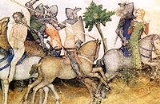
Chivalry
Overview
Knightly Virtues
Knightly Virtues were part of a medieval chivalric code of honor. The virtues were a set of 'standards' that Knights of the High Middle Ages tried to adhere to in their daily living and interactions with others. Today, this term still carries similar meanings.Some organizations attempt to continue...
, honour
Honour
Honour or honor is an abstract concept entailing a perceived quality of worthiness and respectability that affects both the social standing and the self-evaluation of an individual or corporate body such as a family, school, regiment or nation...
and courtly love
Courtly love
Courtly love was a medieval European conception of nobly and chivalrously expressing love and admiration. Generally, courtly love was secret and between members of the nobility. It was also generally not practiced between husband and wife....
: "the source of the chivalrous idea," remarked Johan Huizinga
Johan Huizinga
Johan Huizinga , was a Dutch historian and one of the founders of modern cultural history.-Life:Born in Groningen as the son of Dirk Huizinga, a professor of physiology, and Jacoba Tonkens, who died two years after his birth, he started out as a student of Indo-Germanic languages, earning his...
, who devoted several chapters of The Waning of the Middle Ages
The Autumn of the Middle Ages
The Autumn of the Middle Ages, or The Waning of the Middle Ages, is the best-known work by the Dutch historian Johan Huizinga....
to chivalry and its effects on the medieval character, "is pride aspiring to beauty, and formalized pride gives rise to a conception of honour, which is the pole of noble life."
In English, the word is first attested in 1292, as a loan from Old French
Old French
Old French was the Romance dialect continuum spoken in territories that span roughly the northern half of modern France and parts of modern Belgium and Switzerland from the 9th century to the 14th century...
chevalerie "knighthood", an abstract noun formed in the 11th century based on chevalier "knight", ultimately from Medieval Latin
Medieval Latin
Medieval Latin was the form of Latin used in the Middle Ages, primarily as a medium of scholarly exchange and as the liturgical language of the medieval Roman Catholic Church, but also as a language of science, literature, law, and administration. Despite the clerical origin of many of its authors,...
caballārius "horseman"; cavalry
Cavalry
Cavalry or horsemen were soldiers or warriors who fought mounted on horseback. Cavalry were historically the third oldest and the most mobile of the combat arms...
is from the Italian form of the same word, loaned via Middle French
Middle French
Middle French is a historical division of the French language that covers the period from 1340 to 1611. It is a period of transition during which:...
into English around 1540.
Between the 11th century and 15th centuries medieval writers often used the word shivalry, in meanings that changed over time, generally moving from the concrete meaning of "status or fee associated with military follower owning a war horse" towards the moral ideal of the Christian warrior ethos propagated in the Romance
Romance (genre)
As a literary genre of high culture, romance or chivalric romance is a style of heroic prose and verse narrative that was popular in the aristocratic circles of High Medieval and Early Modern Europe. They were fantastic stories about marvel-filled adventures, often of a knight errant portrayed as...
genre which became popular by the 12th century, and the ideal of courtly love propagated in the contemporary Minnesang
Minnesang
Minnesang was the tradition of lyric and song writing in Germany which flourished in the 12th century and continued into the 14th century. People who wrote and performed Minnesang are known as Minnesingers . The name derives from the word minne, Middle High German for love which was their main...
and related genres.
By the 15th century, the term had become mostly detached from its military origins, not least because the rise of infantry in the 14th century had essentially confined knightly horsemanship to the tournament grounds, and essentially expressed a literary ideal of moral and courteous behavior.
Regardless of the diverse written definitions of chivalry, the medieval knightly class was adept at the art of war, trained in fighting in armor, with horses, lances, swords and shields.
Discussions

